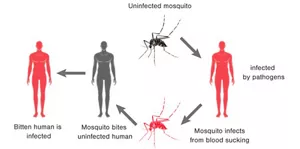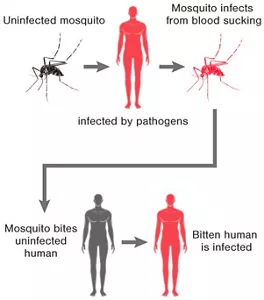Basic Information on Mosquitoes
Mosquito-borne Infectious Diseases
The mechanism of mosquito-borne diseases and pathogen transmission is explained.
Mosquito-borne infections
Mosquitoes cause diseases, such as malaria, dengue fever, and Japanese encephalitis. These diseases are caused by the pathogens listed in Table 1 [1]. When a mosquito bites a human or other animal infected with these pathogens, the pathogen is transferred to the mosquito and propagates inside the mosquito. When a mosquito that has propagated a pathogen in the body sucks blood from another person, the saliva of the mosquito is transferred to the human body and the human is infected with the pathogen (Figure).
Table 1: Mosquito-borne pathogens and disease names
| Disease name | Pathogen | Primary vector mosquitoes |
|---|---|---|
| Dengue fever | Dengue virus | Aedes aegypti, Aedes albopictus |
| Malaria | Plasmodium malaria | Anopheles |
| Yellow fever | Yellow fever virus | Aedes aegypti |
| Japanese encephalitis | Japanese encephalitis virus | Culex pipiens |
| Zika fever | Zika virus | Aedes aegypti, Aedes albopictus |
| Chikungunya fever | Chikungunya virus | Aedes aegypti, Aedes albopictus |
Figure: Mechanism of pathogen transmission by mosquitoes



Refernce:
-
[1]Sumangala BK., Aravind G. (2017) Evolution, current status and prospects of phyto-repellents against mosquitoes. Int J Pharmacol Phytochem Ethnomed, 8:54-73
- Home
- Innovation
- Research & Development
- Infectious Disease Control Study Dengue Virus Mosquito Research
- Basic Information on Mosquitoes
- Mosquito-borne Infectious Diseases
- Home
- Innovation
- Research & Development
- Infectious Disease Control Study Dengue Virus Mosquito Research
- Basic Information on Mosquitoes
- Mosquito-borne Infectious Diseases
